Many people are carriers of the Epstein Barr virus, but few know what kind of organism it is. Read about how it affects human health and how to treat the illnesses caused by it.
Contents
- Epstein Virus Barr is the causative agent of infectious mononucleosis
- How is the Epstein Barr virus transmitted?
- What is dangerous for Epstein Barr virus?
- Symptoms of Epstein Barr virus in adults and children
- VIDEO: Infectious mononucleosis - Dr. Komarovsky's school
- Epstein Barr virus, diagnosis
- Epstein's virus Barr during pregnancy
- Antibodies to the Epstein's virus Barr. Norm of the Epstein Barr virus
- How to treat Epstein Barr virus medication?
- People's treatment of the Epstein Barr virus
- VIDEO: What is dangerous for the Epstein-Barr virus?
Nowadays doctors successfully manage infectious diseases because they take measures not only to eliminate the symptoms of the disease, but also to destroy the most pathogenic microorganism, this disease provoked. In the course of various scientific studies, numerous pathogenic viruses, bacteria and fungi were identified. One of them is the Epstein Barr virus.
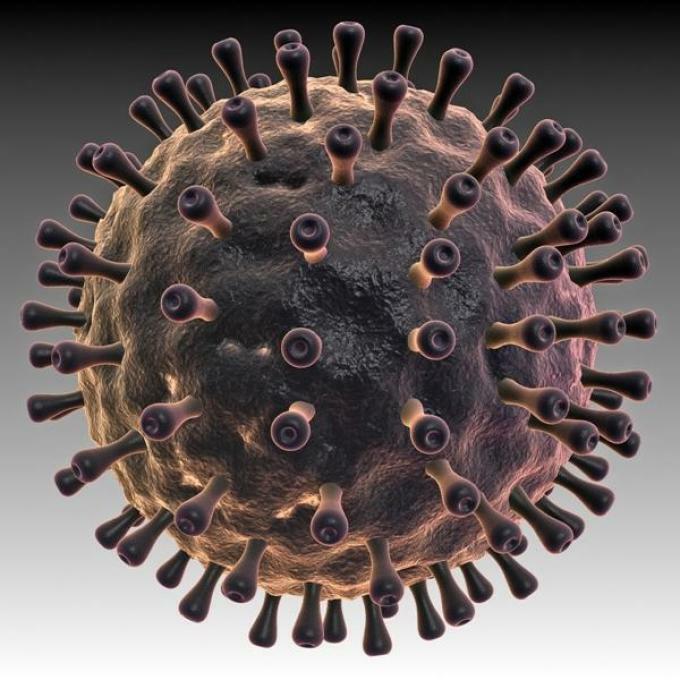 The Epstein virus - Barr is the causative agent of infectious mononucleosis and other diseases, including cancer.
The Epstein virus - Barr is the causative agent of infectious mononucleosis and other diseases, including cancer. Epstein Virus Barr is the causative agent of infectious mononucleosis
Epstein Virus Barr is a DNA-containing microorganism, the 4th type of human herpesvirus( Herpesviridae).A complex name he received in honor of the scientists who discovered him.
IMPORTANT: The pathogenic microorganism was discovered in Canada in the 70s of the last century by the scientists Michael Epstein and Yvonne Barr.
But the Epstein-Barr virus behaves slightly differently than other human herpes viruses: replicating in cells, including B-lymphocytes, it does not lead to their death, but, on the contrary, provokes division and, accordingly, tissue proliferation.
Epstein-Barr contains specific antigens:
- capsid
- nuclear
- early
- membrane
IMPORTANT: Outside the human body, the Epstein-Barr virus is not persistent. He quickly dies under the direct rays of the sun. Speed up its death by ultraviolet irradiation and disinfection
How is the Epstein Barr virus transmitted?
The Epstein Barr virus is very contagious. The mononucleosis provoked by it is spread all over the world. According to statistics, 90% of young people have immunity against this virus.
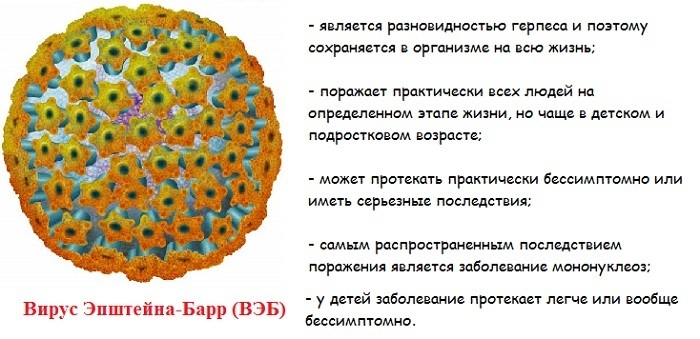 General information about EBV.
General information about EBV.It is transmitted:
- by airborne droplet
- through the body fluids( including saliva with a kiss, therefore mononucleosis has one more name - "kissing disease")
- by means of household contact( through household items, children's toys, etc.)
- by the sexual way
- during the passage of the child through the genital tract of the mother during childbirth
What is dangerous for the Epstein Barr virus?
If infection with EBV occurred once, some of the pathogens are permanently stored in the human body.
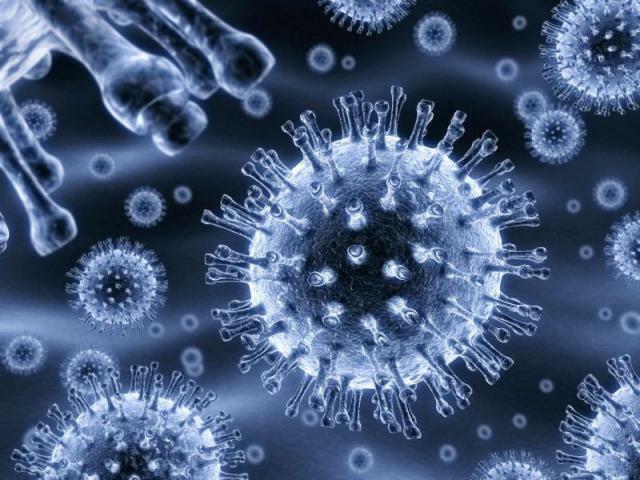 VEB is an oncogenic virus.
VEB is an oncogenic virus. When the carrier of VEB is healthy, the virus disease in it is hidden silt and with mild symptoms.
If the immunity of the infected person is weakened, the virus systematically affects:
- epithelial cells of the mucous membranes( often tonsils, less often - the trachea and bronchi)
- epitheliocytes
- neutrophils
- macrophages
- NK cells
- T - lymphocytes
Infectious mononucleosis, is difficult for patients, difficultis treated. But he is not the only attack provoked by the Epstein virus - Barr. It can also cause more serious diseases, for example, Burkitt's lymphoma.
IMPORTANT: Burkitt's lymphoma is a malignant B-lymphocyte disease that subsequently spreads to the bone marrow, spinal fluid and blood. It is diagnosed in children and youth more often than males in Africa and the United States. In Europe, cases of Burkitt's lymphoma are rare
The same infectious mononucleosis is dangerous in that it is chronic and lead to:
- relapse
- the appearance of benign and malignant diseases( eg, nasopharyngeal carcinomas)
- the appearance of autoimmune diseases( eg, lupus erythematosus, rheumatoid arthritis,)
IMPORTANT: After an infectious mononucleosis, some patients develop a chronic fatigue syndrome, which can manifest for months
Symptoms of the Epstein virusBarry in adults and children
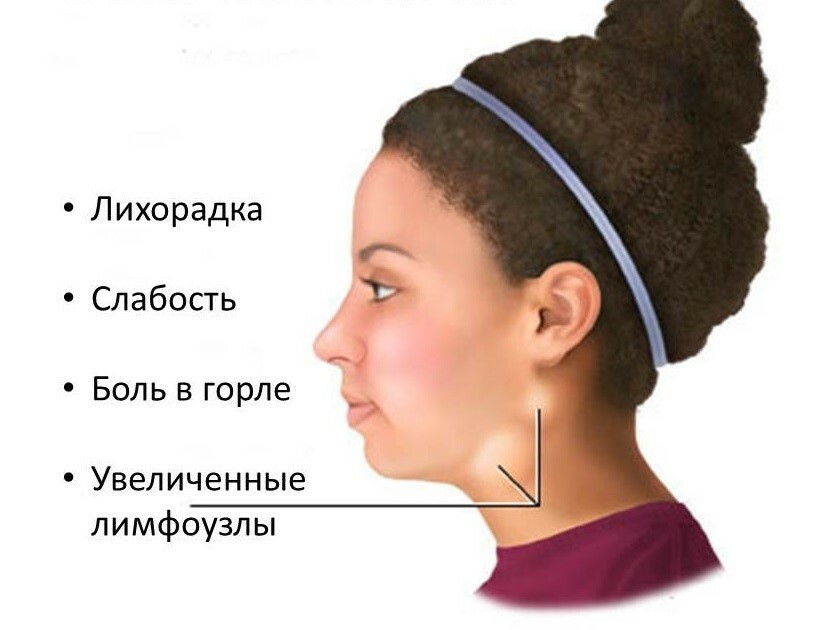 Symptoms of mononucleosis caused by EBV.
Symptoms of mononucleosis caused by EBV.Usually, in adults and children, the Epstein-Barr infection manifests itself in the form of mononucleosis.
The incubation period can be from 1 to 3 weeks.
In young children, due to the weakness of the immune system, mononucleosis starts sharply with:
- rise in temperature to 38-40 degrees
- significant increase in lymph nodes
- swelling of the nasopharyngeal mucosa
- obstruction of nasal breathing
- inflammations of the tonsils and adenoids
- plaque on the tonsils
- general weakness and malaise
- concentration disorder
 At first mononucleosis with symptoms is similar to angina.
At first mononucleosis with symptoms is similar to angina.The virus has later manifestations:
- After 5-7 days after the onset of the disease, the liver and other internal organs increase after the enlargement of the lymph nodes. The patient starts to hurt his stomach. He may also have jaundice
- After activating the capsid antigen, the patient develops a skin rash
. As a rule, mononucleosis lasts 2-4 weeks. After recovery the person still half a year - year distributes viruses.
VIDEO: Infectious mononucleosis - Dr. Komarovsky's school
Epstein Barr virus, diagnosis
Because of the absence of symptoms or their erasure, early diagnosis of Epstein-Barr infection is not possible.
Symptoms of infectious mononucleosis, as well as immunodeficiency state - an occasion to suspect a virus infection. Its presence in the human body is confirmed by laboratory tests.
 To identify the virus and antibodies to it, a blood test helps.
To identify the virus and antibodies to it, a blood test helps.The blood test shows:
- leukocytosis( up to 20 000 μL-1 starting from the 10th day after the onset of symptoms)
- lymphocytosis( large irregular forms of lymphocytes in the blood, called atypical mononuclears, because of them a disease called mononucleosis)
- mild neutropenia
- easy thrombocytopenia
In the analysis by PCR in the saliva and blood of a patient, the DNA of the Epstein-Barr virus is detected.
Epstein Barr virus in pregnancy
As mentioned above, antibodies to the Epstein-Barr virus are in the blood of 9 out of 10 adults. This means that in the group at risk of contracting this pathogens, only 1 in 10 pregnant women.
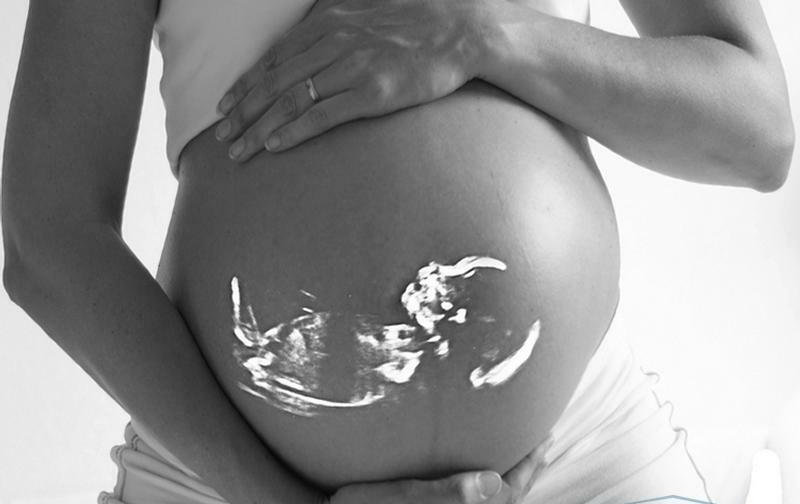 Primary infection of EBV during pregnancy threatens the future mother and baby.
Primary infection of EBV during pregnancy threatens the future mother and baby.IMPORTANT: Few people remember for certain what childhood infections he had suffered in the past. Therefore, at the stage of pregnancy planning or being "in position", it is recommended that a woman be tested for antibodies to the Epstein-Barr virus and other viruses
. If the primary infection still occurs during pregnancy, the virus in the woman's body will behave,how strong is her immunity:
- in a healthy future mother will not have any symptoms, or will symptoms of SARS
- in a future mother with a decreased immunity starts infectious mononucleosis
In connection with infection, the virusom Epstein - Barr in a pregnant woman there are such risks:
- spontaneous abortion
- premature birth
- fetal hypotrophy( up to 80% of pregnancies)
- CNS lesions in the fetus( up to 30% of pregnancies)
- damage to the organs of vision( up to 10% of pregnancies)
- jaundice of newborns( up to 10% of pregnancies)
- respiratory distress in newborns(small percentage)
Antibodies to the Epstein virus Barr. Norm of the virus Epstein Barr
It is recommended to take tests for the presence of antibodies to herpesviruses to anyone who plans pregnancy( to men and women), as well as to all pregnant women.
 The result of the test for antibodies to EBV.
The result of the test for antibodies to EBV.IMPORTANT: The summary immunosorbent assay of antibodies to type 4 human herpesvirus( VEB) includes the detection of antibodies to:
- capsid antigen( IgG and IgM antibodies)
- nuclear antigen( IgG antibody)
- early antigen( IgG antibody)
EBat different laboratories can differ, therefore it is necessary to specify it at the laboratory assistant or to look on the form.
How to treat Epstein Barr virus medication?
The EB virus itself is not treated, but its manifestation is infectious mononucleosis. Treat it symptomatically. Antiviral therapy is also used.
- Patients are prescribed antiviral( Acyclovir) and immunomodulating( Aflubin, Otsilokoktsinum) preparations
- Antipyretics( Ibuprofen, Paracetamol)
- are prescribed for normalization of the temperature. For analgesia, analgesics
- are prescribed. To calm the mucous throat, local antiseptics( Septepryl, Ingalipt, etc.)
- increase the resistance of the body prescribe vitamins
- If a secondary bacterial infection appears, prescribe antibiotics
- If due to swollen mucous breathingpathways and enlarged tonsils, there was a threat of strangulation, the patient is prescribed glucocorticosteroids
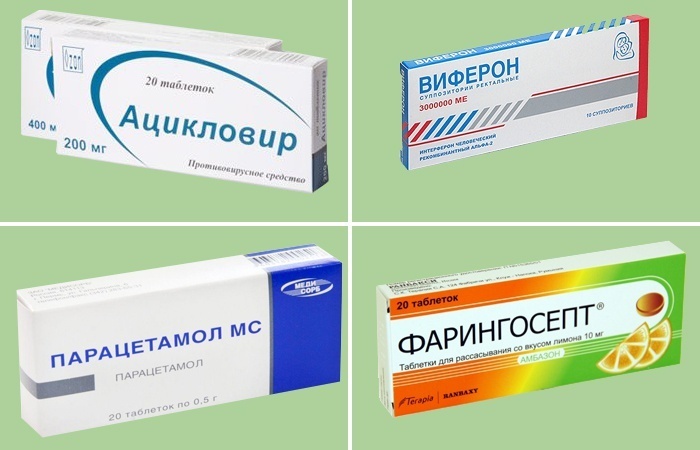 Ebstein-Barr virus is treated in a complex way.
Ebstein-Barr virus is treated in a complex way.IMPORTANT: Mononucleosis gives complications to the liver and spleen. Patient prescribe a therapeutic diet number 5, and restrictions in physical activity( to avoid rupture of the spleen)
Folk treatment of the Epstein Barr virus
 It is possible to relieve manifestations of mononucleosis with the help of folk remedies.
It is possible to relieve manifestations of mononucleosis with the help of folk remedies.When infected with the Epshane-Barr virus, maintenance treatment with folk methods is used:
- for rinsing the sore throat - broths of chamomile, plantain, other herbs
- for soothing mucus - inhalation with essential oils
- for improving immunity - tea with lemon, honey, ginger root,, broth of wild rose, tincture of ginseng
- for liver protection - decoctions of yarrow, immortelle, chamomile
- for anesthetizing lymph nodes and removing their puffiness - ointments with essential oils of conifers, canine, goat and badger fat
